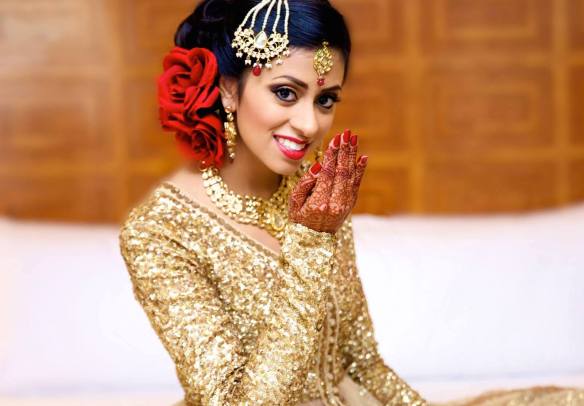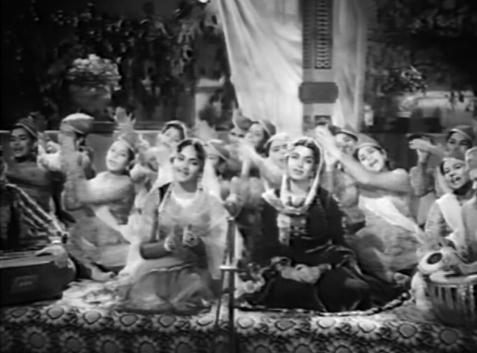
Vijayantimala reads a love letter from her childhood sweetheart Rajendra Kumar in “Yeh Mera Prem Patra” from Sangam (1964).
Happy Valentine’s Day to all our fans! In celebration of this romantic holiday, we present the lyrics and English translation to one of our favorite love songs, “Yeh Mera Prem Patra” from the hit film Sangam (1964). Radha (played by Vijayantimala) and Gopal (played by Rajendra Kumar) play two childhood lovers who have kept their feelings hidden because of Kumar’s best friend, Sundar (played by Raj Kapoor), who has professed his unwavering devotion to Radha for years. Although Radha spurns Sundar’s love, Sundar begs his best friend Gopal to make sure no other man spoils his chances when Sundar is called to serve in the air force on the northern front.
But then! Sundar is killed while serving his country–and in their shared mourning, Radha and Gopal can finally express their undying love for one another. A shining moment in Mohammed Rafi’s career, “Yeh Mera Prem Patra” is their outpouring of uninhibited romance. With a heavenly chorus in the air that highlights the dream-like world in which the two now find themselves, Radha runs across an open meadow to Gopal as he writes her a love letter. In fact, she is so eager to discover what he has written, that her sari falls from her shoulder in her haste, revealing the front of her blouse.
Let’s pause right here. For anyone uninitiated to classic Hindi films, believe me when I say, this NEVER happens. The heroine in classic Bollywood would never let her sari fall so revealingly, and surprisingly, Radha makes NO moves to adjust it. The scene is filmed brilliantly–because of the camera’s position, the sari show is purely for the viewer to ponder–Gopal is facing the audience and cannot see what we have all noticed. It’s as if the director, Raj Kapoor, is telling us that the romance we are witnessing is not purely chaste. And indeed, the like the Radha-Gopal of Hindu mythology, the film’s two lovers are not to be destined for eternal bliss.

ABOVE: Vijayantimala quietly approaches Rajendra Kumar with her sari having fallen off her shoulder. BELOW: Rajendra Kumar and Vijayantimala tussle for the end of her sari playfully while the low camera height emphasizes the beautiful open skies.
The song references the famous Ganga and Jamuna rivers from whose geographical confluence with the river Saraswati (sangam), the film derives its name. The triangular symbolism and references to the sangam is evoked throughout the film, with each character embodying one of the three ancient rivers. Sangam made history as Raj Kapoor’s first technicolour film and one of the first Bollywood films to be shot in exotic locals such as Venice, Paris and Switzerland.
But beneath all the glitter, did you know there’s actually true love story behind this sweet poem? At the age of 20, the famed Urdu lyricist of “Yeh Mera Prem Patra,” Hasrat Jaipuri, fell in love his own Radha, a young Hindu woman from hometown in Jaipur. Though they never married, she would inspire many of his greatest poems. Jaipuri later recalled fondly in an interview:
“Meri haveli ke samne, ek badi khoobsurat ladki rehti jiska naam tha Radha. Aur ishq ka mahzab se, zaat paat se, koi taaluq nahii.N. Kisi se bhi ho sakta hai, kisi se bhi kiya jaa sakta hai. To mera unse pyaar hua. Taalim maine sher-o-shayari ki, mere naanaa madhoom/manhoom se haasil ki?, lekin ishq ka sabak jo hai, woh Radha ne padhaayaa ki ishq kya cheez hai.”
[“Near my home a very beautiful girl lived named Radha. And neither religion nor caste and creed have any power over love. It can happen with anyone and it can happen to anyone. And so I fell in love with her. I may have trained in poetry from my grandfather, but the lesson of love was taught by Radha.”]
“Yeh Mera Prem Patra” is the very love letter that Jaipuri wrote to his real life Radha–more than 20 years before Raj Kapoor would use the same sweet poem in Sangam! So this Valentine’s Day, we at Mr. and Mrs. 55 recommend you do something old-fashioned and write your special someone a romantic love letter! For inspiration, soak up Hasrat Jaipuri’s shy, tender lyrics and our English translation to the sentimental love letter, “Yeh Mera Prem Patra” below!
Yeh Mera Prem Patra Lyrics and Translation:
“Meherbaa.N” likhuu.N? “Haseenaa” likhuu.N? Yaa “dilruubaa” likhuu.N?
Should I write “compassionate one”? Should I write “beautiful one”? Or should I write “beloved”?
Hairaan huu.N ki aap ko is khat mei.N kyaa likhuu.N
I am puzzled by what to write in this letter to you
Yeh meraa prem patra paDh kar, ki tum naaraaz na honaa
When you read this love letter of mine, may you not be angry
ki tum merii zindagii ho, ki tum merii bandagii ho
For you are my life, for you are my prayer
Tujhe mai.N chaand kehtaa thaa, magar us mei.N bhi daagh hai
I used to call you the moon, but in the moon are blemishes
Tujhe suraj mai.n kehtaa thaa, magar us mei.N bhi aag hai
I used to call you the sun, but in the sun is ablaze
Tujhe itnaa hii kehta huu.N ki mujhko tumse pyaar hai, tumse pyaar hai, tumse pyaar hai
I tell you only this that I love you, I love you, I love you
Tujhe Gangaa mai.N samajhuu.Ngaa, tujhe Jamunaa mai.N samajhuu.Ngaa
I will think of you as the Ganges River, I will think of you as the Jamuna River
Tu dil ke paas hai itnii, tujhe apnaa mai.N samajhuu.Ngaa
You are so close to my heart, I will think of you as my own
Agar mar jaauu.N ruuh bhaTakegii tere intezaar mei.N, intezaar mei.N, intezaar mein
If I die, my soul will wander waiting for you, waiting for you, waiting for you
Yeh meraa prem patra paDh kar, ki tum naraaz na honaa
When you read this love letter of mine, may you not be angry
ki tum merii zindagii ho, ki tum merii bandagii ho
For you are my life, for you are my prayer
Glossary:
meherbaa.N: compassionate one; likhnaa: to write; haseenaa: beautiful lady; dilruuba: lover; hairaan: puzzled, stunned; khat: letter; prem: love; patra: letter; paDhnaa: to read; naaraaz: angry; zindagii: life; bandagii: prayer; chaand: moon; daagh: flaw, blemish; suraj: sun; aag: fire; pyaar: love; Gangaa: Ganges River; Jamunaa: Jamunaa River; dil: heart; [kisi ke] paas: to be nearby [something]; mar jaanaa: to die; ruuh: soul; bhaTaknaa: to wander; intezaar: wait

Rajendra Kumar and Vijayantimala romance each other in a sunlit garden in Sangam (1964). For once in his life, Rajendra Kumar’s outfit of choice adds to the ambiance rather than destroys.
One of my favorite moments both musically and cinematically in this song comes at the very end when Lata Mangeshkar picks up the chorus over a beautiful wide tracking shot of the lovebirds walking hand-in-hand in the Elysian forest. This heavenly moment can only be seen and heard in the movie, it was tragically cut from the record version we know so well!

Adab arz hai! This love poem is dedicated to my very romantic new husband and personal Bollywood hero!
Soon after this song, Sundar surprises the couple by returning from war alive! Sundar then marries Radha because his devoutly loyal friend Gopal is unable to tell him his true feelings (like a typical Bollywood bromance, don’t you just love how the woman has basically ZERO say in all this?). Inevitably, of course, the famous love letter is later discovered and Raj Kapoor is heartbroken. See our English translation of the epic self-pitying “Dost Dost Na Raha” for more of the drama that unfolds!
But let us temporarily forget all that on this lovely Valentine’s Day. This beautiful ode was requested by dedicated fan Inderjit Wassi! Thank you for the poetic request!
– Mrs. 55





